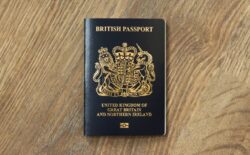The cost of a new passport is rising. (Picture: Shutterstock / Paul Maguire)
Renewing your passport can be an arduous task, but there are ways to make your life a bit easier as the expiry date approaches.
Unfortunately, it has been announced that the cost of a new passport will be increasing from February 2023.
However, whether you’re renewing your passport or applying for one for the first time, there are strict rules you must follow in the process.
One of the mandatory requirements for some applications is having them countersigned by someone else.
This step is to prove your own identity to the HM passport office, but it doesn’t apply to everyone.
If you’re looking to renew your passport this year, here is everything that you need to know.
Passport renewal cost
From February 2, 2023 the cost of renewing a passport will rise from £75.50 to £82.50 for adults and from £49 to £53.50 for children.
Postal applications will also rise, going from £85 to £93 for adults and from £58.50 to £64 for children.
According to a government statement: ‘The new fees will help the Home Office move towards a system that meets its costs through those who use it, reducing reliance on funding from general taxation.
‘The government does not make any profit from the cost of passport applications.’
If you’re in the UK you can renew your passport if:
It’s expired or will expire soon (including if you currently have a child passport)
Replace your passport if it’s been lost, stolen or damaged;
Change the details on your passport.
How to renew your passport
It’s essential that you renew your passport before you travel if it has expired or is due to.
However, it is advisable not to book a holiday if your passport has expired, as your new passport will contain a new number.
Make sure to check your passport expiry date before you book a holiday. (Picture: Getty Images/iStockphoto)
If your passport will expire soon, you may be required to renew it before travelling.
As such, it is important to check the entry requirements of the countries you’re visiting before booking travel.
You can renew your passport by doing the following:
Going to a Post Office that has a Check and Send service
Calling the Passport Adviceline.
The online renewal means you’ll be able to submit a new picture of yourself by someone taking a photo of you using a digital camera or smartphone.
However, you can still submit your application by post or use the Passport Check and Send service – you’ll need two identical new photos of yourself.
Who can countersign?
You’ll need to get someone else to sign your application form and passport photo if you need the following:
First adult passport
First child passport
Replacement for a lost, stolen or damaged passport
Renewal of a passport for a child aged 11 or under
Renewal of a passport if your appearance has changed and you can’t be recognised from your existing passport
You’ll need a countersignature if you’re applying for your first passport. (Picture: Shutterstock / justit)
According to the passport office, that person has to meet these criteria:
Have known the person applying (or the adult who signed the form if the passport is for a child under 16) for at least two years;
Be able to identify the person applying, e.g. they’re a friend, neighbour or colleague (not just someone who knows them professionally);
Be ‘a person of good standing in their community’ or work in (or be retired from) a recognised profession (for a full list click here).
The countersignatory can’t be related by birth or marriage. They also can’t be in a relationship with or live at the same address as the applicant.
They can’t work for the HM Passport Office and can’t be a doctor, unless they know you well.
By signing it they are confirming that:
They’ve known you for more than 2 years;
You’re who you claim to be;
As far as they know, all the information you’ve put on the form is true.
Your countersignatory must put their passport number on the form and should write the following on the back of one photo:
‘I certify that this is a true likeness of [title and full name of adult or child who is getting the passport].’
A full list of recognised professions can be found here.
If you’re applying in the UK, your countersignatory must:
Live in the UK
Have a current British or Irish passport
For those applying outside the UK, their signer can have either a British, Irish or other EU, US or Commonwealth passport.
MORE : Stormzy ‘misses flight to Qatar World Cup final’ after passport dispute at Heathrow airport
MORE : Benefits, driving tests and passport control face disruption as civil service strike looms
Follow Metro across our social channels, on Facebook, Twitter and Instagram
Share your views in the comments below
Make sure to check the expiry date before booking any trips away.





